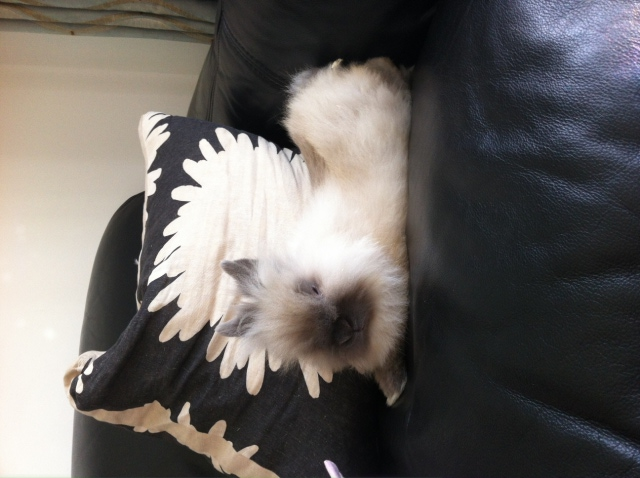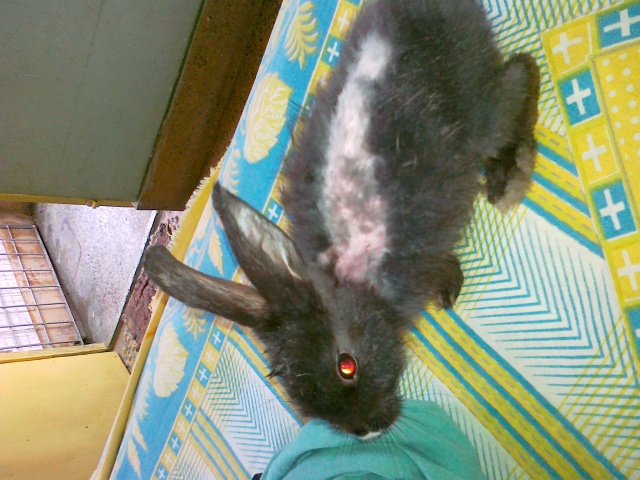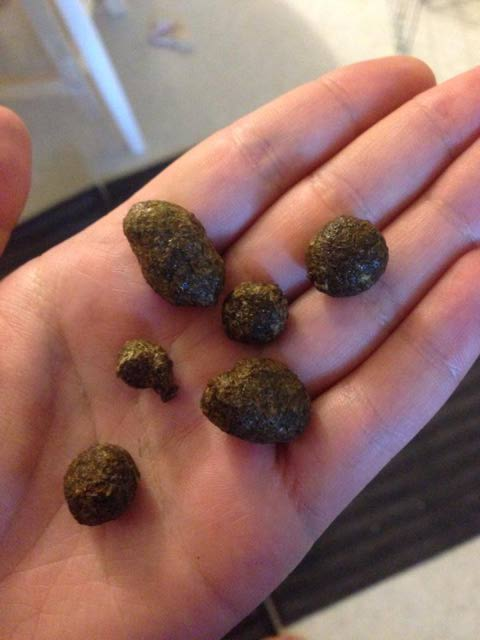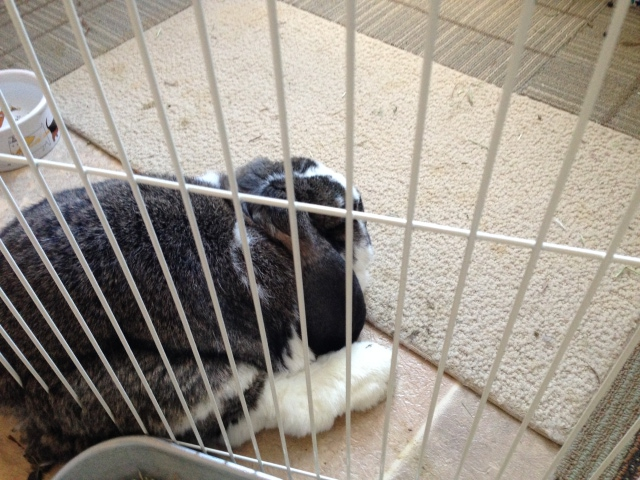Questionhi, i have a 7-8 year old dwarf rabbit named Cracker Jack. The other day i noticed her acting weird. I went to pet her and she fell over. I left her out of her cage to run and she was falling over and stumbling like she was drunk. i took her to the vet and she believes it is an inner ear infection. She is on Baytril right now and seems to be the same yet. She is eating and drinking. The main reason im emailing you is because the vet told me that in rare cases this could be a brain tumor. This got me extremely upset. From the things i told you, what does it sound like? Im really upset and dont know what to do. I dont know how long it takes this medicine to work. Like i said, she has an appetite and is drinking. please reply. thanks
AnswerHi Linda,
This is one of my specialties. I agree with your vet, the most likely issue is an inner and/or middle ear infection. And she is drunk....she has vertigo. A rabbit can't focus on a fixed object directly in front of them....they have a blind spot in front of their nose. They see different images from each eye so they depend on their ears (just like we do) and their feet to orient themselves in an upright position. You will also most likely notice the "roving eye syndrome" (nystagmus) as your rabbit frantically searches to orient itself. Most rabbits will develop head tilt (torticollis) and their head will start to twist to one side. They always tilt to the side of the worst infection.
I am not a vet but I do treat these infections often as we see it often in our rescue. Most vets treat vestibular infections far too conservatively. I usually treat with a couple of drugs that attack in different ways. I do not use Baytril with rabbits. While it is still the primary antibiotic used by most vets....I retired Baytril's use in rabbits long ago....and nearly all of the specialized exotics vets have also done so. The bacteria we are finding has in many cases developed resistance to that drug. I don't want to say I use a "stronger" antibiotic because there is no such thing....one drug is not stronger than the other but is more targeted.
What I am going to say here is not intended to contradict your vet since she is in the best position to make the calls. What I am going to say here is intended only as topics of conversation with your vet in an effort to provide the best treatment possible for your rabbit. Again, please understand that I am not a vet.
>Antibiotics. Get a culture and sensitivity of the debris in the ear. Knowing the primary pathogens that are usually responsible for these infections, my drug list for treating this (depending on the results of the lab work) are Zithromax, Penicillin or Chloramphenicol. I have recently been doing some work with a newly approved drug (for dogs and cats anyway) called Convenia. I have to stress that even though you might be able to get your hands on these drugs without the vet...if they are not administer properly, it usually results in death. Used under the direction of a rabbit savvy vet, each of these drugs is safe (keep in mind that any medical procedure carries some risk) and effective. I generally use an ear drop....usually Baytril Otic (contains enrofloxacin and silver sulfadiazine) and it's important to get it deep inside the canal....not just the flaps and folds at the top. It needs to get deep.
>Hydration. An infection usually results in a fever which can quickly dehydrate most small animals. Make sure she is drinking lots of water. Unflavored Pedialyte (the human infant stuff) can be used to help replenish lost electrolytes. Leafy greens such as romaine lettuce or dandelions also help with hydration (used in moderation). It might become necessary to supplement fluids either by sub-q or IV. Sub-q is usually quite easy to do...and is something you can do at home. Ask your vet about selling you the supplies to do so....and to train you how and when to administer fluids.
>Pain/Stress Management. This is a crucial piece of the puzzle that is often overlooked. An ear infection does involve some inflammation which is painful. And since a rabbit is a prey animal, knowing they can escape from a predator is very stressful(even in our domestics). So pain meds are essentail. Metacam is an excellent choice to start. It's an NSAID similar to our Tylenol. It is really useful in working with the inflammation deep in the canal and can help with the vertigo. It is essential that your rabbit be properly hydrated and that this drug should not be used more than 3-4 days unless directed by a vet. It can be damaging to the liver and somewhat to the kidneys. If she is really stressed and rolling....some sedation by narcotics might be very helpful just to take the edge off. Buprenorphine is an excellent pain med in this case and can be used together with Metacam. Tramadol is also a good choice and can be used also with Metacam (it does have to be compounded into a suspension). If she is really stressed, valium can be of major help with that.
>Vertigo. Some rabbits get some relief if given Meclizine....it's the active ingredient in motion sickness drugs. Doesn't work in all rabbits for reasons unknown...but if it helps Cracker Jack, that's great.
As far as the Baytril....it usually takes at least 48 hours to even start getting in the system. If you use Baytril, it seems to be more effective when administered as sub-q injections. It also tastes horrible. When I did use Baytril, I used the injectable version as an oral drug and flavored it with FlavoRX. I have treated ear infections for as long as 7 months before getting a clean culture....but that was an extreme event. Treated properly, things should clear up in a couple of weeks.
As far as a tumor, I agree with your vet. It would be rare. We have seen some abscess concerns, mostly dental, contribute to an ear infection but most likely you would have other signs. There is one thing I am concered about at this age. There is a protozoan infection called E Cuniculi that is common in rabbits. It is carried subclinically in just about every domestic rabbit. While EC doesn't cause head tilt or other infections directly, it does lead to a compromised immune system that can allow these infections. I would highly suggest doing a blood panel on this rabbit. One benefit in this is to watch the kidney and liver values. But I would be very interested in knowing the blood titer for E Cuniculi. Your vet will understand the titer deal. Blood work can tell you a lot about what's really going on.
This is a lot of info to digest. Read it over and get back to me with any questions. Again, I am not attempting to contradict your vet here. I have just treated so many of these issue successfully and I am just offering points of conversation for you and your vet. Good luck.

 Tip of Rabbits ear going floppy
Question
Winstion
Hi Dana.
I recently adopted a 5-mon
Tip of Rabbits ear going floppy
Question
Winstion
Hi Dana.
I recently adopted a 5-mon
 One Rabbit or Two
QuestionQUESTION: Hi Cat, I am reading conflicting view
One Rabbit or Two
QuestionQUESTION: Hi Cat, I am reading conflicting view
 Is my rabbit sheding or has some other problem?
Questionbald rabbit
QUESTION: I am Indrani from
Is my rabbit sheding or has some other problem?
Questionbald rabbit
QUESTION: I am Indrani from
 Young rabbits irregular poops
QuestionPoops
QUESTION: Hello!
Im stumped. My ne
Young rabbits irregular poops
QuestionPoops
QUESTION: Hello!
Im stumped. My ne
 hind end weakness
Question
hind end weakness
Hello Dana,
I apolog
hind end weakness
Question
hind end weakness
Hello Dana,
I apolog